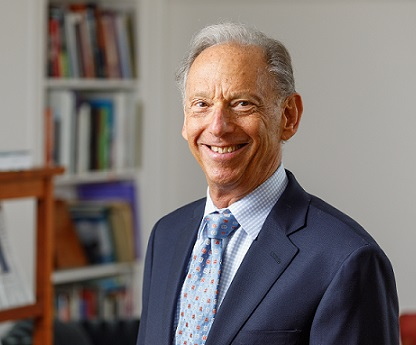
Courtesy of Alan Kazdin
In 2017, Yale Sterling Professor of Psychology and Child Psychiatry Alan Kazdin created a free online class that offers a “toolkit of techniques” to help parents develop positive behaviors in their children. Since its Coursera launch, over 100,000 parents, caregivers and professionals have logged onto the platform to learn the formula for child behavior change. If they need more knowledge, they can also turn to a reliable parenting guide book.
Kazdin’s four-week course, “Everyday Parenting: The ABCs of Child Rearing,” provides video demonstrations of research-based, step-by-step techniques for parents, including readings and practice exercises. Kazdin’s “ABCs” of parenting –– antecedents, behavior and consequences –– encourage parents to put recognition, affection and choice at the center of their practices, according to the professor.
“We [had] been working on developing effective treatments for children who are extremely violent and aggressive,” Kazdin told the News. “After years of working on this, we received emails from all over the world saying things like ‘You can get children to stop beating up their peers and teachers, to stop setting fires, to stop destroying property –– can you get my 2-year-old to eat vegetables or my teenage daughter to stop having a horrible attitude and swearing when I just ask, ‘How was school?’”
After receiving so many messages, Kazdin and his team of researchers and therapists felt compelled to expand their services. While still providing care for clinically referred cases through the Yale Parenting Center, Kazdin said, they began offering individualized parenting sessions via videoconferencing for those who wanted help with the routine challenges of child-rearing.
Still, the individualized nature of Kazdin’s program translated to unsustainable higher costs, he told the News. With insufficient funding to continue the program, Kazdin then created his online course, made free by Yale and Coursera, to make his methods accessible to parents worldwide. It is offered in English with subtitles in French, Portuguese, Chinese, Greek, Russian and Spanish.
Gloria Russo Wassell, who worked with Kazdin as a clinical researcher at the Yale Parenting Center and is a chief advisor at a digital wellness company, spoke to the News about the work that Kazdin and his team have put into the course project.
“As a psychological researcher and methodologist, Dr. Kazdin has attended to a level of detail and nuance in his clinical research together with his team to fine-tune every strategy and technique,” Wassell said. “That is the level of detail that has been brought into each module in the ‘Everyday Parenting’ course.”
Erin Carrubba, a research clinician at the Yale Parenting Center, worked with Kazdin as a research therapist.
According to Carrubba, the course takes empirical research “developed to address behavioral disorders, conduct disorders and oppositional defiance disorders, and makes them accessible to everyday parenting.”
Even though these skills were developed to tackle behavioral difficulties, Carrubba said, they have helped with the routine struggles that most parents face.
Kazdin’s video demonstrations break down the ABCs. The “A” –– child behavior antecedents –– covers what to do before a negative behavior, such as a tantrum, occurs. The professor teaches parents how to outline the behavior itself in “B,” by “breaking it down into doable steps, practic[ing] the behavior repeatedly through simulations and model[ing] the behavior.” Finally, “C” –– consequences –– teaches parents about the importance of recognition and praise.
Kazdin told the News that many of the techniques taught in the course are, actually, counterintuitive.
“[Parents] who have a superficial knowledge of child behavior tend to focus solely on the consequences,” explained Kazdin. “They often think that the procedure is rewarding or punishing behavior. The main message of my entire approach is that repeated practice changes the way the brain understands habits. So, parents must repeatedly use strategic praise if they want to change child behavior.”
Kazdin’s research also shows that choice increases the likelihood of compliance. A parent’s command for the child to “get ready, we’re going outside” is less well received by the child than if they were given a choice: “Would you like to wear your red jacket or your green jacket? We’re going outside.”
Wassell, who has implemented Kazdin’s methods in her career as a therapist and as a parent, shared her lessons with the News.
She explained that when introduced at home, these skills are new for both children and parents. Her advice is to choose times to practice them when the demand is not present. For instance, if the child tends to tantrum when transitioning, she recommends that parents begin practicing the techniques when there are no demands. She also suggests turning it into a game –– offering an age-appropriate reward afterward might help.
“Dr. Kazdin uses an analogy regarding the importance of practicing,” Wassell said. “‘Once you’re in a situation where someone’s drowning, you can’t teach them to swim.’ Trying to reason with a child in crisis tends to be ineffective. At that point, they need support to get through the moment. Practicing techniques in advance will increase the chances of success when the behavior occurs.”
Kazdin’s course also offers a module on “Parenting During COVID-19.”
Wassell commented that the pandemic has placed new demands on families –– doing more from home can increase the need for managing child behaviors.
“Kazdin’s course offers techniques that can help parents prevent and manage behaviors and create new routines brought on by demands of the pandemic, such as remote learning, parents having to oversee more activities in the home, or shaping behaviors to wear masks and social distance,” Wassell told the News. Kazdin’s other resources include a website with articles, videos and more on childrearing topics, as well as books for professionals in the field of child psychology.
Maria Antonia Sendas | mariaantonia.henriquessendas@yale.edu







